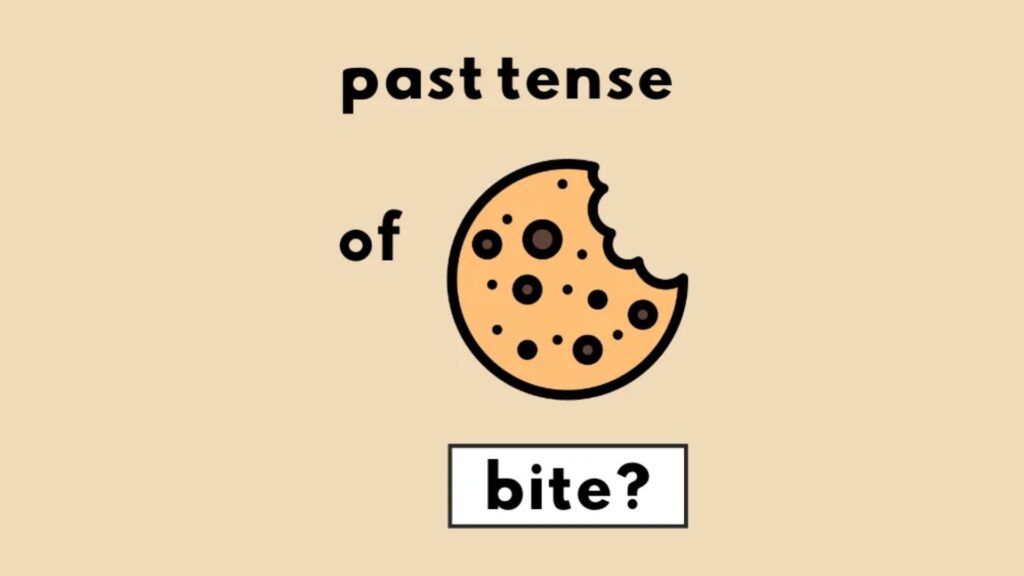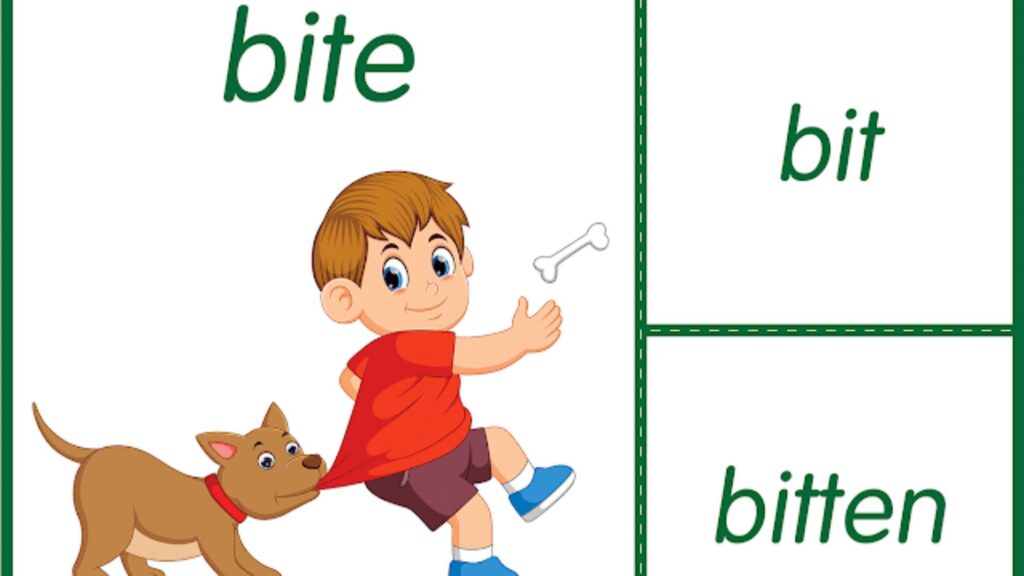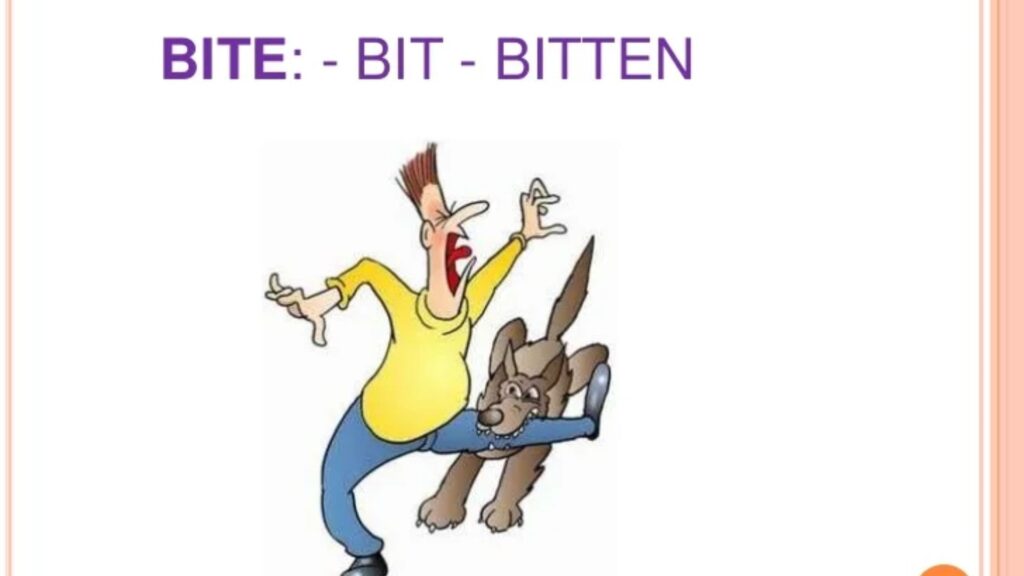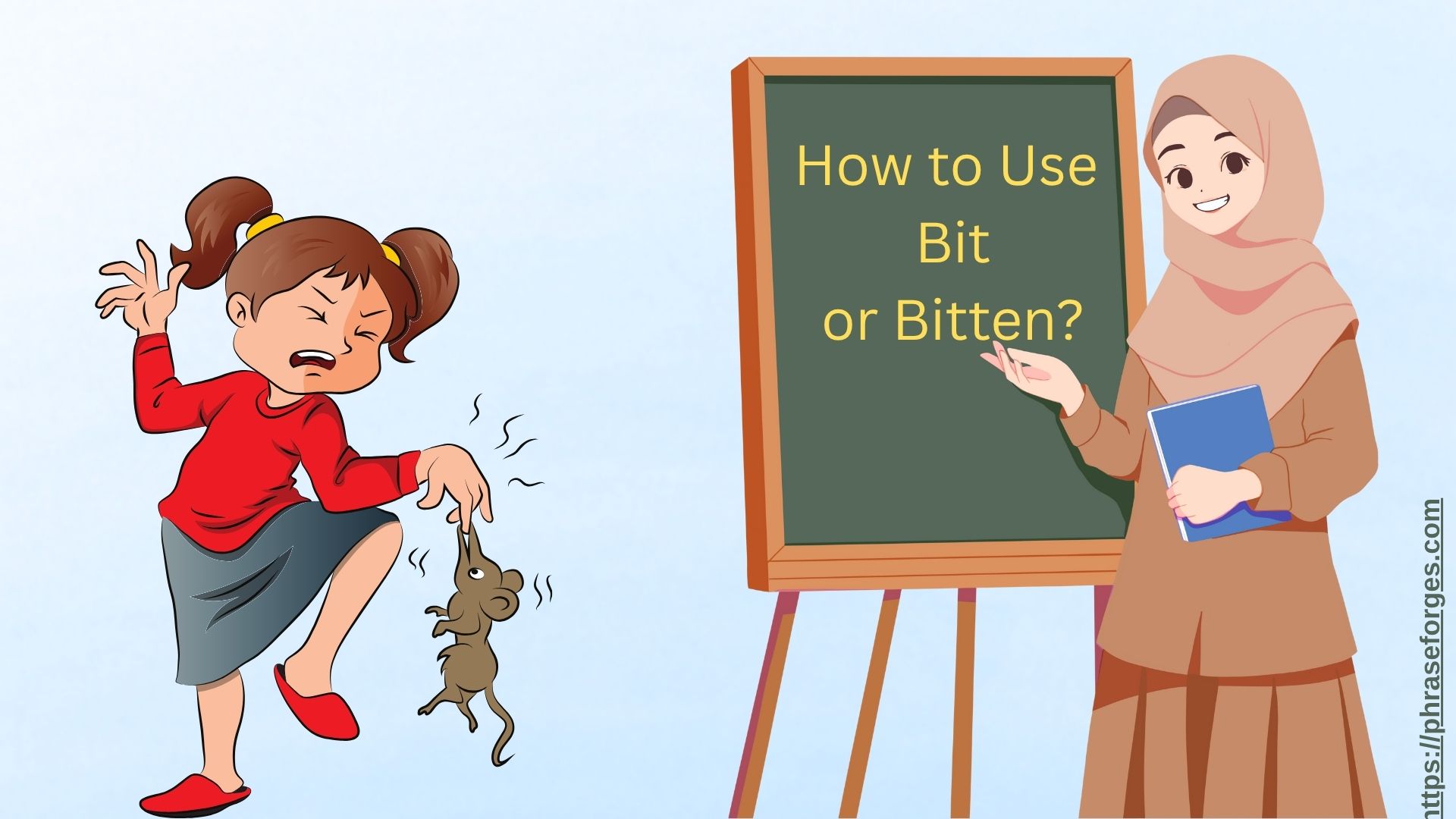Ever been stuck between “bit” and “bitten”, unsure which one sounds right? Don’t worry you’re definitely not alone. The verb “bite” is one of those pesky irregular verbs that doesn’t follow typical conjugation rules. And while the difference may seem small, using the wrong form can make a sentence feel awkward or worse, grammatically incorrect.
This article breaks down everything you need to know about using bit or bitten, with grammar tips, real-life examples, common mistakes, and even a few bite-themed idioms for flavor.
Let’s sink our teeth in.
Keyword + Intro Explanation

The past tense of bite causes confusion because of its irregular verb pattern. Unlike regular verbs that end in “-ed” (like “walked” or “climbed”), “bite” changes completely in its past and past participle forms:
- bit = simple past tense
- bitten = past participle
So, when deciding between bit and bitten, the trick is to focus on verb tense conjugation. And yes, understanding that difference matters if you want to sound polished and grammatically sharp.
Simple Definition + Usage Overview
Here’s a quick look at how “bite” conjugates:
| Tense | Verb Form | Example Sentence |
|---|---|---|
| Base (present) | bite | I bite my lip when I’m nervous. |
| Past Simple | bit | She bit the cookie in half. |
| Past Participle | bitten | He has never been bitten by a spider. |
| Present Participle | biting | The toddler is biting her toy. |
| Future | will bite | The dog will bite if provoked. |
| Perfect Tenses | have/has/had bitten | We had bitten more than we could chew. |
| Continuous Forms | was/am/will be biting | She was biting her nails during the movie. |
Clear Rules & Patterns

Now let’s break this down so you always know when to use bit vs bitten.
✅ Use bit when:
- You’re talking about the past, and there’s no helping verb like have, has, or had.
Example:
Last night, something bit me while I was asleep.
✅ Use bitten when:
- You’re using a perfect tense like present perfect, past perfect, or future perfect.
- It follows a helper (auxiliary) verb: have, has, or had.
Example:
I have never been bitten by a mosquito in winter.
Bulleted Rules with Do’s and Don’ts
✔ Do:
- Use bit alone to describe a completed past action.
- Use bitten only with auxiliary verbs (have, has, had).
- Remember that bitten is the past participle, not the past tense.
❌ Don’t:
- Say “I have bit…” (wrong).
- Use “bitten” without a helping verb (wrong).
- Confuse tense construction in perfect forms.
Multiple Example Sentences
Let’s look at both verb forms in action across various sentence structures.
💬 Using Bit (Simple Past):
- The dog bit the mailman yesterday.
- Sarah bit into the chocolate and smiled.
- He accidentally bit his cheek while chewing.
💬 Using Bitten (Perfect Tenses):
- I’ve been bitten by jealousy more than once.
- She had already bitten into the sandwich when I warned her it was spicy.
- By tomorrow, he will have bitten the dust in the video game again.
Scenario Examples (With Emails)
✉️ Email Example Using “Bit”
Subject: Playground Incident – FYI
Hi Mr. Rodgers,
Just a quick heads-up. During recess, Alex was bit by another student while they were playing tag. It wasn’t serious just a little scrape. We cleaned it up and notified both sets of parents.
Let me know if you’d like a follow-up.
Thanks,
Ms. Carter
✉️ Email Example Using “Bitten”
Subject: Camp Safety Update
Hi Dr. Eliza,
One of the campers, Jamie, mentioned that he had been bitten by ants during the hike. He’s fine now, and the first aid team treated the bite with topical ointment.
Just keeping you in the loop.
Warm regards,
Camp Coordinator – Jill W.
Before/After Examples in Everyday and Formal Contexts
| Context | Incorrect | Correct |
|---|---|---|
| Casual speech | I have bit my lip again. | I have bitten my lip again. |
| Narrative writing | The vampire had bit the victim. | The vampire had bitten the victim. |
| Professional email | She was bit by a dog yesterday. | She was bitten by a dog yesterday. |
Common Mistakes & Fixes
Here are some common verb misuse issues:
- ✘ He has bit the apple already.
✔ He has bitten the apple already. - ✘ They were bit during the hike.
✔ They were bitten during the hike. - ✘ You had bit off more than you could chew.
✔ You had bitten off more than you could chew.
Quick Reference Table
| Form | Use With | Example |
|---|---|---|
| bit | Simple past (no helper) | The cat bit me. |
| bitten | Perfect tenses (with helper) | He has bitten his lip. |
| bitten | Passive voice | She was bitten by a snake. |
Idioms & Figurative Uses of “Bite”
“Bite” shows up all over English not just literally.
Here are a few idioms and expressions that use the verb “bite”:
- Don’t bite off more than you can chew
(Don’t take on more than you can handle) - Bite your tongue
(Stop yourself from saying something) - Bite the bullet
(Do something unpleasant or difficult with courage) - Bite the dust
(Fail or die in a humorous way) - Don’t bite the hand that feeds you
(Don’t turn against someone who helps you) - Grab a bite
(Get something to eat quickly)
Helpful Mnemonic
Try this to remember the rule:
🧠 “Bit stands alone. Bitten needs backup.”
- Bit can stand by itself in the past.
- Bitten needs a helping verb to work.
Why Grammatical Accuracy Matters

When you mix up bit and bitten, it may not always stop a conversation but it can affect how credible you sound, especially in writing. Whether you’re drafting an email, giving a presentation, or writing a novel, using the right verb tense improves clarity, professionalism, and style.
Final Bite-Sized Takeaway
To recap:
- Bit = simple past. Use it alone for past events.
- Bitten = past participle. Use it with “has,” “have,” or “had.”
- Avoid saying “have bit” that’s never correct.
- Watch for passive constructions: “was bitten,” not “was bit.”
Mastering just one verb like bite helps you get better with others like:
- write – wrote – written
- ride – rode – ridden
- sing – sang – sung
Now that you’ve got it down, you’re less likely to be bitten by this grammar bug again.

